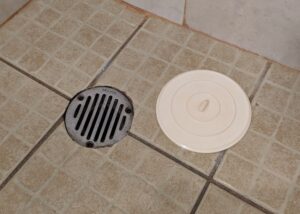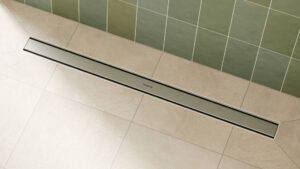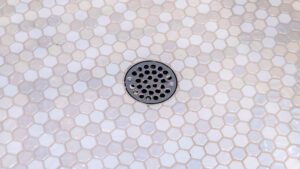Have you ever noticed a foul odor emanating from your shower drain after a bout of rain? If so, you’re not alone. Many homeowners encounter this peculiar problem and often wonder why does my shower drain smell after rain. Understanding the root causes of this issue is essential for addressing it effectively. In this article, we’ll delve into the reasons behind this phenomenon and offer solutions to help you maintain a fresh-smelling bathroom.

Understanding the Connection Between Rain and Drain Odors
Before we explore the solutions, it’s crucial to comprehend the connection between rain and your shower drain’s odor. During rainfall, the sewer systems can become overwhelmed, causing a backup of gases. These gases can escape through your plumbing and into your home, often manifesting as unpleasant odors.
The Role of Sewer Gas
Sewer gas is a mixture of various gases, including hydrogen sulfide, ammonia, and methane. These gases can produce a distinctive rotten egg smell that many people find offensive. When it rains, the pressure in the sewer system changes, forcing these gases up through your plumbing and into your shower drain.
Blocked Vent Pipes
Another potential cause of shower drain odors after rain is blocked vent pipes. Vent pipes are responsible for maintaining proper air pressure in your plumbing system, allowing wastewater to flow smoothly. If these pipes become blocked, it can disrupt the balance, leading to unpleasant smells.
Identifying the Source of the Smell
To effectively address the issue of a smelly shower drain, you must first identify the source of the odor. Here are some common culprits:
P-Trap Issues
The P-trap is a curved section of pipe beneath your drain that holds water and prevents sewer gases from entering your home. If the P-trap becomes dry due to infrequent use, it can allow odors to escape. Regularly running water down the drain can help keep the P-trap filled and functioning properly.
Clogged Drains
Clogs in your shower drain can trap organic matter and produce foul smells. Hair, soap scum, and debris can accumulate over time, leading to blockages. Regular cleaning and maintenance can prevent these issues. For more on this, you can check how to deep clean a drain.
Biofilm Buildup
Biofilm, a slimy layer of bacteria, can develop in your pipes and contribute to odors. This buildup is often the result of organic material accumulating in the drain. Regular cleaning with a mixture of baking soda and vinegar can help break down biofilm and eliminate odors.
Solutions for a Smelly Shower Drain
Once you’ve identified the source of the odor, it’s time to take action. Here are some effective solutions to combat shower drain smells:
Regular Cleaning
Regular cleaning is essential for preventing odors. Use a drain snake or pipe brush to remove debris and buildup from your drain. Additionally, consider using a mixture of baking soda and vinegar to break down any remaining residue. For more tips, visit drain maintenance tips.
Ensure Proper Ventilation
Proper ventilation is crucial for preventing sewer gases from entering your home. Check your vent pipes for blockages and clear any obstructions. This can help maintain the balance of air pressure in your plumbing system.
Seal Gaps and Cracks
Check for any gaps or cracks in your plumbing fixtures and seal them with caulking. This can help prevent sewer gases from escaping into your home.
When to Call a Professional
While many shower drain odor issues can be resolved with DIY solutions, there are instances where professional help is necessary. If you’ve tried the above solutions and the smell persists, it’s time to call a plumber. A professional can assess your plumbing system and identify any underlying issues that may be causing the odor.
For insights on when to involve a plumber, you can check fixing drains without a plumber.
Preventing Future Odors
Prevention is key to avoiding future shower drain odors. Here are some tips to keep your drains smelling fresh:
Regular Maintenance
Schedule regular maintenance for your plumbing system to prevent blockages and odors. This includes clearing debris, checking for leaks, and ensuring proper ventilation.
Use Drain Covers
Consider using drain covers to catch hair and debris before they enter your pipes. This can help prevent clogs and reduce the risk of odors.
Conclusion
In conclusion, understanding why does my shower drain smell after rain can help you take the necessary steps to address and prevent this issue. By identifying the source of the odor and implementing the appropriate solutions, you can maintain a fresh-smelling bathroom all year round. Remember, regular maintenance and proper ventilation are key to keeping your drains odor-free.

FAQs
Why does rain affect my shower drain smell?
Rain can cause changes in sewer system pressure, allowing gases to escape through your plumbing.
How can I prevent shower drain odors?
Regular cleaning, proper ventilation, and using drain covers can help prevent odors.
When should I call a plumber for a smelly drain?
If DIY solutions don’t work, it’s time to call a plumber to assess your plumbing system.
This article contains affiliate links. We may earn a commission at no extra cost to you.




